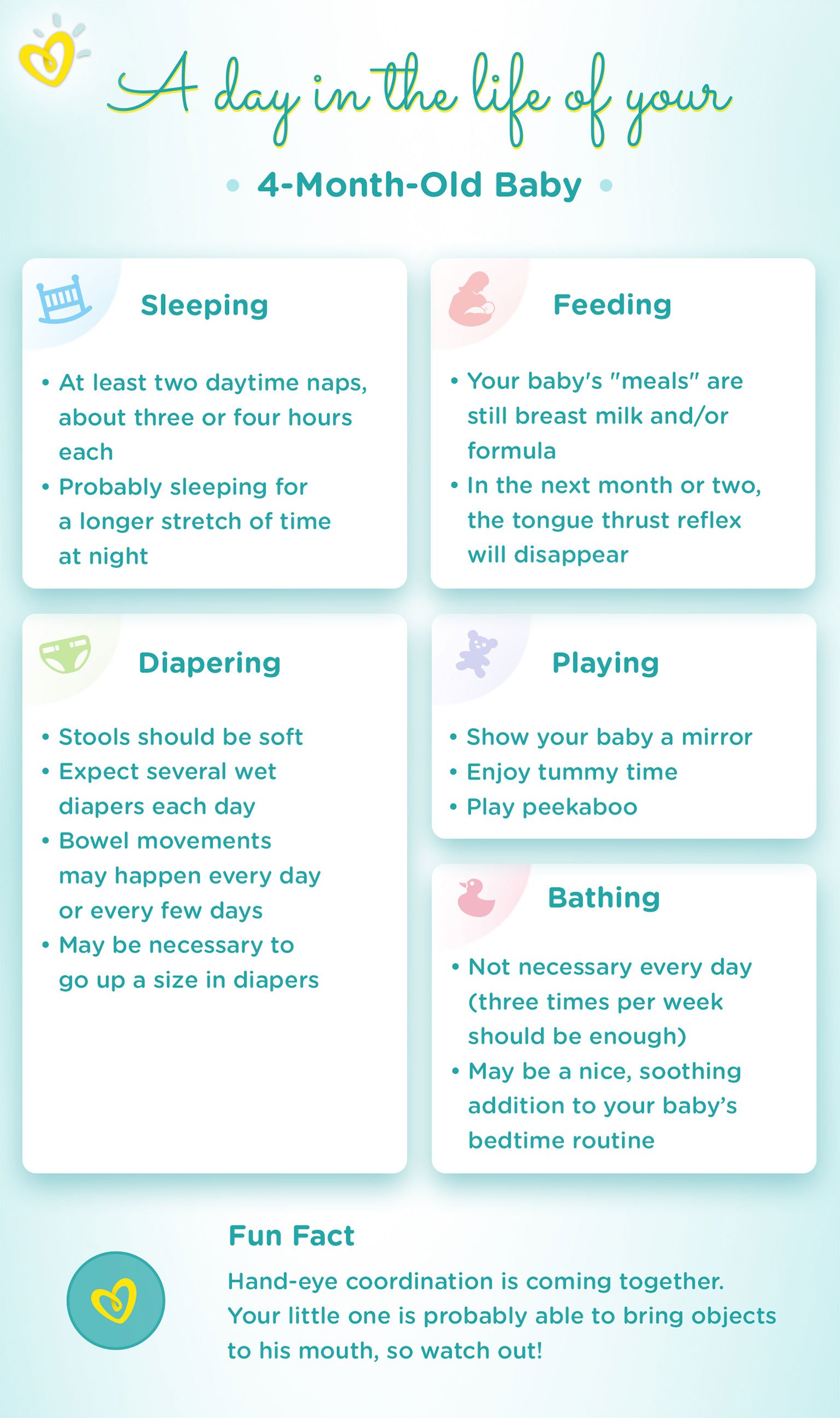

I space the first two naps 1.5 hours apart and the last 2 naps 2 hours apart. The key is that you’re wanting your baby to get 15-16 total hours of sleep a day (including naps & night time).

4 month old babies usually nap 4-5 times a day. Babies at this age haven’t yet learned to connect their sleep cycles so it’s common to have a nap that is just one sleep cycle. Naps at this age are typically 45 mins to an hour. And that’s OK! Just try to implement as often as you can. Some days the schedule may get thrown off and I do have to nurse right before my baby goes to sleep. This isn’t always possible to do this based on your baby’s nap schedule. This way they are not associating nursing with going to sleep and will likely sleep better at night. The key premise here is that you want to feed your baby AFTER they are awake. The “Eat, Activity, Sleep” schedule was introduced in the Baby Whisperer book and I have tried to implement this with both of my babies. This schedule has naturally emerged from following a 1.5-2 hour wake time in between naps and trying to do an “Eat, Activity, Sleep” schedule. How many naps for a 4 month old?Īs you can see our 4 month old is napping 4 times a day now. For example, if your baby wakes up at 7am, then bedtime should be around 7:30-8pm. Note: If your baby wakes up earlier, adjust the times above accordingly. *Sometimes there is a middle of the night feed around 5am. It is common for baby to still get up 1-2x per night after the first 5-8 hour stretch at this age. Here is our 4 month old breastfeeding schedule:Ĩpm – Nurse / Bottle (We do a pumped bottle from 8pm onward) This is the perfect time to get your baby into a routine as they naturally settle into a 4-5 nap schedule. Now that our baby is 4 months her bedtime is drifting earlier and I expect this to continue as she gets older. Bedtimes can also be late and erratic the first 3 months so we’ve been managing a night owl schedule. Up until this point, we haven’t had a schedule, which is usually normal with newborns. Newborn’s sleep schedules are erratic so it is hard to get into a consistent routine before 4 months of age. Looking for more Breastfeeding Support?.You will discover these things for yourself as you and your baby get to know each other. No book―or website―can tell you precisely how much or how often they need to be fed or exactly how you should handle them during feedings.

The most important thing to remember, whether you breastfeed or bottlefeed, is that your baby's feeding needs are unique. Getting to know your baby's feeding needs Sometimes patterns of obesity begin during infancy, so it is important not to overfeed your baby. If your baby still seems to feed very frequently or consume larger amounts, try distracting them with play or with a pacifier. Their stomach capacity has increased, too, which means they may go longer between daytime feedings-occasionally up to 4 or 5 hours at a time. They're consuming more during the day, and their sleeping patterns have become more regular (although this varies considerably from baby to baby). ), most formula-fed babies no longer need a middle-of-the-night feedings. Eating & sleeping patternsīetween 2 and 4 months of age (or when the baby weighs more than 12 lb. As you become familiar with their signals and needs, you'll be able to schedule their feedings around their routine. As time passes, your baby will begin to develop a fairly regular timetable of their own. Initially it is best to feed your formula-fed newborn a bottle on demand, or whenever they cry with hunger. Some babies have higher needs for sucking and may just want to suck on a pacifier after feeding. Your baby should usually drink no more than an average of about 32 ounces (960 mL) of formula in 24 hours. If your baby consistently seems to want more or less than this, discuss it with your pediatrician. If they drain the bottle and continues smacking their lips, they might still be hungry. If they become fidgety or easily distracted during a feeding, they're probably finished. But they probably will regulate their intake from day to day to meet their own specific needs, so let them tell you when they've had enough. On average, your baby should take in about 2½ ounces (75 mL) of infant formula a day for every pound (453 g) of body weight. If your baby sleeps longer than 4 to 5 hours during the first few weeks after birth and starts missing feedings, wake them up and offer a bottle.īy the end of the first month: Your baby will be up to at least 3 to 4 ounces (120 mL) per feeding, with a fairly predictable schedule of feedings about every 3 to 4 hours.īy 6 months: Your baby will consume 6 to 8 ounces (180–240 mL) at each of 4 or 5 feedings in 24 hours.


 0 kommentar(er)
0 kommentar(er)
